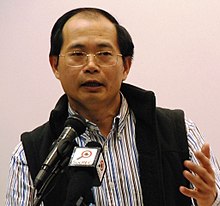Chin Wan
Chin Wan | |||||||||
|---|---|---|---|---|---|---|---|---|---|
陳云根 | |||||||||
 Chin Wan in 2012 | |||||||||
| Born | 8 November 1961 Hong Kong | ||||||||
| Nationality | Han | ||||||||
| Alma mater | Chinese University of Hong Kong University of Göttingen | ||||||||
| Occupation(s) | Scholar and writer | ||||||||
| Notable work | On the Hong Kong City-State series | ||||||||
| Movement | Hong Kong Resurgence Order | ||||||||
| Chinese name | |||||||||
| Traditional Chinese | 陳云根 | ||||||||
| |||||||||
| Chin Wan | |||||||||
| Traditional Chinese | 陳雲 | ||||||||
| |||||||||
| Website | Chin Wan on Facebook | ||||||||
Horace Chin Wan-kan (born 8 November 1961), better known by his pen name Chin Wan, is a
Biography
Background
Chin was born in Hong Kong in 1961. His father, a
Chin became one of the leading critical intellectual voices against the destruction of local communities and historical edifices that occurred in the course of urban redevelopment. Many of the newspaper columns, which he wrote under the pen name Chin Wan, supported the young radicals who took an increasingly militant stance against Hong Kong and Chinese real estate tycoons and Beijing's intervention in Hong Kong.
"Godfather of localism"
In 2011, Chin published the book On the Hong Kong City-State. His analysis of what he considered China's "neo-imperialist" stance in Hong Kong, and his repositioning of the democracy movement in "localist camp" terms, triggered fierce public debate and was popular among the young generation. Chin emphasised the significance of Hong Kong autonomy for the sake of Hongkongers.[6]
Chin argued that a
Chin advocates "Hong Kong First" and "Hong Kong-China separation" positions and opined that the influx of
Chin became well known for his inflammatory remarks on
During the 2014 Hong Kong protests, Chin called for militant actions in contrast to the non-violent movement advocated by the mainstream organisers, Occupy Central with Love and Peace, Hong Kong Federation of Students and Scholarism. He had criticised the Occupy organisers even before the protests, stating their peaceful approaches would achieve nothing but their own personal moral high ground. He was later on asked to report to the police on suspicion of inciting and organising an unauthorised assembly.[11]
2016 LegCo bid
He joined an
On 2 March 2021, Chin stated on Facebook that he and some Hong Kong youths established a new party — Hong Kong Civile Party.[citation needed]
See also
References
- ^ Nao (21 October 2014). "No buses are due on Nathan road – Mong Kok occupation 2.0 weekend sum-up". libcom.org.
- ^ "Localism: Why is support for the political perspective growing - and who's behind it?". Time Out Magazine. 1 July 2015. Archived from the original on 4 March 2016. Retrieved 6 December 2015.
- ^ "'First academic casualty after Occupy': Lingnan Uni refuses to renew contract of radical professor". Hong Kong Free Press HKFP. 14 April 2016.
- ^ Cheng, Tsz-yu (1 December 2016). "三城記(二):陳雲 回到逃難者的時空". Ming Pao.
- ^ a b c d Lau, Stuart (10 June 2013). "Independent thinker Horace Chin treads bold path". South China Morning Post.
- ^ a b c d Hung, Ho-fung (3 November 2014). "Three Views of Local Consciousness in Hong Kong 香港 地元の意識、三つの視点". The Asia-Pacific Journal. 12 (44).
- ^ Cheng, Kris (14 April 2016). "'First academic casualty after Occupy': Lingnan Uni refuses to renew contract of radical professor". Hong Kong Free Press. Retrieved 4 January 2021.
- ^ a b Chang, Ping (9 June 2013). "Will a democratic China harm Hong Kong?". South China Morning Post.
- ^ Tsoi, Grace (22 November 2012). "The Freedom Trail". HK Magazine.
- ^ "Facebook". Facebook.
- ^ "Leung warning on further threats to social order". The Standard. 7 January 2015. Archived from the original on 2 February 2015. Retrieved 2 February 2015.
External links
- Chin Wan on Facebook
